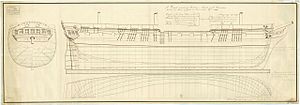HMS Ethalion (1802) facts for kids

Plan of HMS Ethalion
|
|
Quick facts for kids History |
|
|---|---|
| Name | Ethalion |
| Builder | Woolwich Dockyard |
| Launched | 29 July 1802 |
| Commissioned | 1803 |
| Decommissioned | 1816 |
| In service |
|
| Fate | Broken up, 1877 |
| General characteristics | |
| Type | Fifth-rate frigate |
| Tons burthen | 996 tons bm |
| Armament | 36 guns |
HMS Ethalion was a powerful 36-gun frigate that served in the Royal Navy. She was built at Woolwich Dockyard and launched in 1802. This ship had a long and interesting life, serving in different roles for many years before being taken apart in 1877.
Contents
Life at Sea: Ethalion's Service
Ethalion began her service in 1803. Her first captain was Charles Stuart. She sailed in the North Sea, which is a busy area for ships.
Early Captures and West Indies Duty
In May 1804, Ethalion showed her strength. She captured a Dutch ship called Union near Bergen. This ship had 16 guns.
Later, in 1807, Captain William Charles Fahie took command. He sailed Ethalion to the West Indies. This region was important for trade and naval operations.
Capturing Danish Islands
In December 1807, Ethalion joined a group of British warships. This group was led by Admiral Sir Alexander Cochrane. Their mission was to capture Danish islands in the West Indies.
They successfully took St Thomas on December 22. Then, on December 25, they captured Santa Cruz. The Danish forces did not fight back, so these captures happened without any bloodshed.
Invasion of Martinique
Ethalion also played a part in the invasion of Martinique in 1809. Captain Thomas John Cochrane was in charge of the ship at this time.
In April 1809, a strong French fleet arrived near Îles des Saintes. British forces quickly surrounded them. Ethalion was part of the larger British effort during this time. Even though she was not in the main fight, she helped the British win. Because of her role, she shared in the rewards from capturing the islands.
Later Years and the War of 1812
In 1810, Ethalion took a short break from service. But she was back at sea in 1811. She sailed near Lisbon and later in the Baltic Sea.
On April 12, 1812, Ethalion and another British ship, Clio, captured a ship named Opsloe.
Soon after the War of 1812 started, Ethalion helped capture several American ships. This happened on August 12, 1812. The captured ships included Cuba, Caliban, Edward, Galen, Halcyon, and Cygnet.
In November 1813, Ethalion was protecting a group of merchant ships. They were sailing from the St Lawrence River. Bad weather caused the ships to scatter. On December 14, she found and recaptured a ship called Pomona. This ship had been taken by an American privateer.
By 1814, Captain William Hugh Dobbie was commanding Ethalion. She was operating off the coast of Ireland. In 1816, she was put into reserve at Woolwich. This meant she was kept ready but not actively sailing.
Ethalion's Final Years
Ethalion had a long life, even after her active service.
New Roles
In 1823, she was changed into a hospital ship. This meant she was used to care for sick or injured sailors. She served in this important role for many years.
Later, in the 1860s, Ethalion was used as a breakwater. A breakwater is a structure that protects a harbor or coast from waves. This shows how strong and useful her hull still was.
Broken Up
Finally, after many years of service in different ways, Ethalion was broken up in 1877. This means her parts were taken apart and reused or discarded.
 | Charles R. Drew |
 | Benjamin Banneker |
 | Jane C. Wright |
 | Roger Arliner Young |

